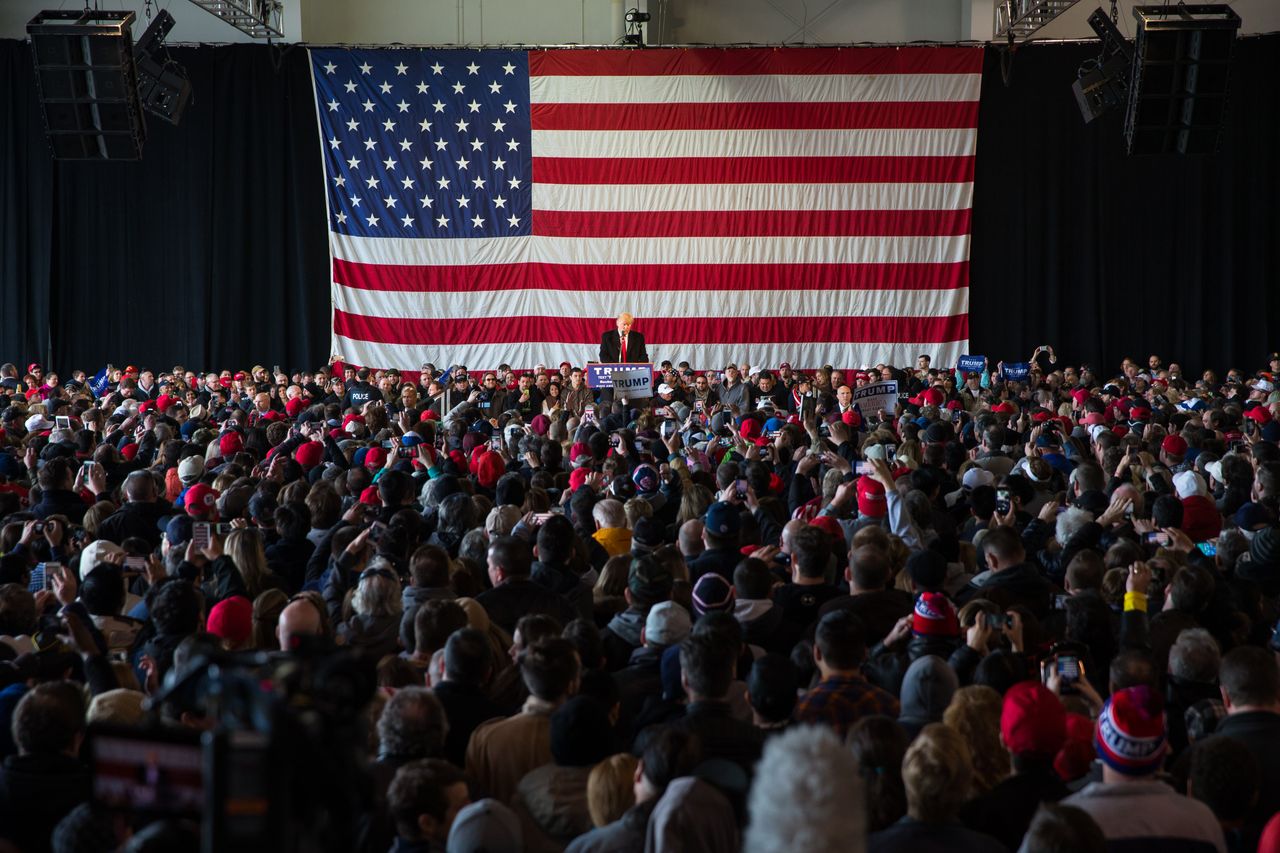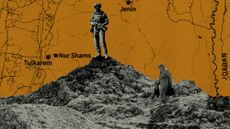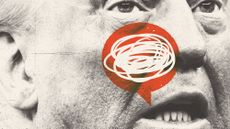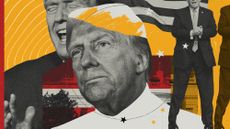John McGraw attacked Rakeem Jones at a Trump rally. Nine months later, they shook hands.
"You and me, we got to heal our country."

They hadn't seen each other since the day one attacked the other, and now it was nine months later, and they were approaching a county courthouse to face each other for the second time. First came John McGraw, 79, who spends his days in leather boots with 2-inch heels — because, he says, "a cowboy can't be 5-foot-8." Then came Rakeem Jones, 27, a man in skinny jeans who has long dreadlocks and tattoos up and down his arms.
McGraw sat in the front row, and Jones found an open seat in the back. The last time they saw each other, McGraw was elbowing Jones in the face at a Donald Trump rally. After Jones was pulled up from the ground by county sheriffs and escorted out of the coliseum, McGraw went even further. "We don't know if he's ISIS. We don't know who he is," he said. "The next time we see him, we might have to kill him."
But it was another thing he said that both men had also been thinking about since that day: "We know he's not acting like an American."
Subscribe to The Week
Escape your echo chamber. Get the facts behind the news, plus analysis from multiple perspectives.

Sign up for The Week's Free Newsletters
From our morning news briefing to a weekly Good News Newsletter, get the best of The Week delivered directly to your inbox.
From our morning news briefing to a weekly Good News Newsletter, get the best of The Week delivered directly to your inbox.
Nine months later, with so many things settled — the rallies done, the election over, Trump the winner — one of the questions that remained in their minds was what it means to be an American.
McGraw voted for Trump. Jones voted for Hillary Clinton. McGraw is white. Jones is black.
If they have anything in common, it's that both live in the same place, but Fayetteville, North Carolina, is an increasingly polarized city in a polarized state in a polarized country, and they live in different parts. Now, hoping this hearing would perhaps bring some clarity, they waited for it to begin.
Five days before the hearing, Jones was cradling a phone against his ear and typing another pizza order into a computer. "Rakeem!" his manager yelled as two pizzas were slid into a carry case and placed beside him at the front counter. "You're out!"
Sign up for Today's Best Articles in your inbox
A free daily email with the biggest news stories of the day – and the best features from TheWeek.com
Working the counter, he makes $7.35 an hour. On deliveries, it goes down to $4.25 an hour, but there's always the chance of a big tip, and he hustled the pizzas to a faded Mitsubishi sedan with a cracked windshield. He'd bought it earlier in 2016 for $1,600 — most of his savings — when McGraw's attack at the Trump rally left him feeling unsafe riding the city bus. What if McGraw was serious about killing him? Considering the way the election had gone, what if a white supremacist group decided to try something? So in the days after the rally, he quit his job after the company's name was published, stopped taking the bus, bought a car, and found a new job in a different part of town delivering pizzas.
He passed a neighborhood — tall pines, wide lawns, and two-story brick houses — that characterizes one part of Fayetteville, a city that is 42 percent black and 46 percent white and anchors a county that went 56 percent for Clinton and 40 percent for Trump. The part he has lived in is mostly trailer parks and corner stores, and if he can ever make enough money at the pizza shop, he'd like to live in a neighborhood like this one, even though he has come to see it as Donald Trump's America, an America where more and more he feels as if he doesn't belong.
He pulled into a gated complex, got out, and saw a large red truck with plates that said: "Kill 'em all. Let God sort 'em out."
"It's Fayetteville," he said. "That's the mentality."
There was a time when he thought differently, not just about Fayetteville but about America. He knew there were racists in his country and community, but he also trusted that its people were tolerant of diversity. But since that night, he has thought about race constantly.
He knocked on a second-floor door, and when a woman and a small boy answered, he smiled.
He handed the pizzas to the boy — "Be careful with that. It's hot" — collected a $2 tip from the woman and walked to his car, feeling pleased. He headed back to the shop, where he saw his next delivery was a large order of 15 pizzas. There had been a delay in getting the food ready, and he knew he would be significantly late. In the car, he thought he recognized the address, so he called ahead to make sure he was heading to the correct place.
"Is that a church?" he asked into the phone. "All right, ma'am. Yeah, I've delivered to this place before."
By the time he got there, the pizzas were 30 minutes late. Balancing all 15 of them against the wall with one hand, he opened the front door with the other and saw a children's party inside. He set the pizzas down on a counter as a man talking on a cellphone came up to him.
"I'm on the phone with your manager right now. We need to talk over here," the man said. "You should have been here 30 minutes ago," he told Jones as the manager listened. "I'm not happy right now."
"I understand," Jones said, as the man said to the manager, "He called, I don't know, maybe 20 minutes ago, saying he was lost."
"I never said I was lost," Jones said quietly.
"You were asking my wife where we were."
"I was making sure it was this church."
"That makes me feel like you were lost," he said. Jones looked straight ahead and was silent as the man spoke again to the manager. "We were planning on giving him a nice large tip, but based on the situation that we got going on here, we're just going to pay for the pizza," he said.
He hung up and gave Jones $100. The bill for the pizza was $98. Another $2 tip. He started back to the pizza shop.
"That's my America," Jones said.
Three days before the hearing, John McGraw was waiting for his attorney to call to talk about what could happen in court. He sat alone in his workshop down a dirt road just outside Fayetteville and glanced at a sheet of paper where he had written all he was going to be doing that day — two belts and a wristband.
McGraw earns income beyond his Social Security checks making leather belts, wristbands, and gun holsters that he sells at gun shows and flea markets. He looked around the cramped shop, which contains nearly everything he owns. A pile of unfinished leather strips. A collection of nine black powder rifles, replicas of the sort used in the Revolutionary and Civil Wars. A miniature Confederate flag and a sign that says, "You can't have my country. You can't have my guns. And I don't want your handouts."
He spends most of his days in this shop and his nights sleeping in a small trailer parked just outside, the latest phase in a life in which he married and divorced three times, had children he hasn't seen in 30 years, worked as a ranch hand and horse trainer in Texas, sold leatherwork, and was now living alone, rarely greeting guests.
At times he has looked at the belts that some people wear, noticing the cheap buckles, the fake leather, and wondered how someone could buy a belt like that. And lately, it has not just been that question, but a lot of questions he has been having about the changes in the country. Gay marriage. How is that now legal? Baltimore and Ferguson. How could people burn down those buildings and shut down the roads? A Trump rally. How could someone think it was OK to shout obscenities and boo a man running for president? Decency. What happened to decency?
And on the night of March 9, when he saw Jones shouting at Trump and others, he got up from his chair as Jones was passing and threw an elbow, and now he was regretting it not only because he was arrested the next day, but because the other person acting indecently had been him.
He looked at his flip phone, saw he hadn't missed any calls from his attorney, and finished the first belt.
He had never considered himself a bigot or a hateful person — far from it — and now, thinking about what happened, as he does every day, he clenched his jaw and shook his head. He said he had never been so humiliated in his life. All the newspaper articles, TV clips, and political ads suggesting he was a racist. But sometimes he felt he was the one who was actually the victim of racism. This wouldn't have been news, he thought, if Jones had been white or he had been black.
His attorney still hadn't called. He looked at his list. All done. He looked at the clock. His day still had six more hours to go.
On the day of the court hearing, McGraw took off his cowboy hat and leather jacket, shifted in his courtroom seat, and didn't say anything. Jones took a seat in the back, and neither one reacted to the other until the judge called the case. McGraw was facing two misdemeanor charges of assault and battery and disorderly conduct. McGraw looked ashen and a little dazed, and when the judge asked how he would plead, his attorney said no contest.
"Does the victim wish to be heard?" the judge asked Jones.
Jones, who had yet to look at McGraw, thought for a moment. "From the beginning, it even took place in front of the sheriffs, the way it was handled wasn't right. He was allowed to go home," he said. "I know he is not going to receive jail time, but at the same time I have a friend who is facing five years for what was, at the root of it, a fight. I just don't understand that."
McGraw, who had looked at Jones the entire time he spoke, now glanced at the judge, who asked McGraw's attorney whether he had anything to say.
"It needs to be stated by my client through me that Mr. McGraw's actions were not racially motivated," the lawyer said.
Jones listened and asked whether he could say more. "Not one time throughout this whole six months have I mentioned race," he said. "I got hit by a man, period."
The judge asked McGraw whether he wanted to say something, too. "I'm extremely sorry this happened," McGraw said, and when the judge told him to explain it to Jones, not him, he turned to Jones and took a step toward him. It was the closest they'd been to each other since the rally.
"This was between two men. You know what you did. And I know what I did. I'm not going to say you were wrong or I was wrong," McGraw said. He stepped closer to Jones and raised a finger. "We got caught up in a political mess today," he said. His jaw began to tremble. "And you and me, we got to heal our country."
"All right, man," Jones said after a moment. He reached out to pat McGraw on the shoulder, and he seemed surprised by the contact. He put out his hand. Jones grasped it, and, as a few claps in the audience grew into applause, the two men embraced.
The sentence McGraw received was one year's probation, and after the judge was done and the case was over, McGraw had one more thing to say to Jones. "We've got to stick together," he quietly told Jones. "We can't let them come between us."
When Jones returned to the trailer park that day, there were outraged messages and online comments. As news spread, more people started calling him a sellout for forgiving McGraw. They told him he was wrong to shake his hand, that he was wrong to hug him. But he believed, with the election weeks past, it was time to let it go. So when McGraw, now in his own trailer, unexpectedly phoned him the next day to see how he was doing and to thank him for his decency, Jones listened awhile and told him he appreciated the call.
Excerpted from an article that originally appeared in The Washington Post. Reprinted with permission.
-
 Why is Netanyahu pushing into the West Bank now?
Why is Netanyahu pushing into the West Bank now?TODAY'S BIG QUESTION Israeli tanks have entered some Palestinian cities for the first time in decades. What's behind this latest assault on the occupied territory, and where could it lead if left unchecked?
By Rafi Schwartz, The Week US Published
-
 What is Mark Cuban's net worth?
What is Mark Cuban's net worth?In Depth Not every Trump-era billionaire has gone full MAGA
By David Faris Published
-
 Musk vs. Altman: The fight over OpenAI
Musk vs. Altman: The fight over OpenAIFeature Elon Musk has launched a $97.4 billion takeover bid for OpenAI
By The Week US Published
-
 'Seriously, not literally': how should the world take Donald Trump?
'Seriously, not literally': how should the world take Donald Trump?Today's big question White House rhetoric and reality look likely to become increasingly blurred
By Sorcha Bradley, The Week UK Published
-
 Will Trump's 'madman' strategy pay off?
Will Trump's 'madman' strategy pay off?Today's Big Question Incoming US president likes to seem unpredictable but, this time round, world leaders could be wise to his playbook
By Sorcha Bradley, The Week UK Published
-
 US election: who the billionaires are backing
US election: who the billionaires are backingThe Explainer More have endorsed Kamala Harris than Donald Trump, but among the 'ultra-rich' the split is more even
By Harriet Marsden, The Week UK Published
-
 US election: where things stand with one week to go
US election: where things stand with one week to goThe Explainer Harris' lead in the polls has been narrowing in Trump's favour, but her campaign remains 'cautiously optimistic'
By Harriet Marsden, The Week UK Published
-
 Is Trump okay?
Is Trump okay?Today's Big Question Former president's mental fitness and alleged cognitive decline firmly back in the spotlight after 'bizarre' town hall event
By Harriet Marsden, The Week UK Published
-
 The life and times of Kamala Harris
The life and times of Kamala HarrisThe Explainer The vice-president is narrowly leading the race to become the next US president. How did she get to where she is now?
By The Week UK Published
-
 Will 'weirdly civil' VP debate move dial in US election?
Will 'weirdly civil' VP debate move dial in US election?Today's Big Question 'Diametrically opposed' candidates showed 'a lot of commonality' on some issues, but offered competing visions for America's future and democracy
By Harriet Marsden, The Week UK Published
-
 1 of 6 'Trump Train' drivers liable in Biden bus blockade
1 of 6 'Trump Train' drivers liable in Biden bus blockadeSpeed Read Only one of the accused was found liable in the case concerning the deliberate slowing of a 2020 Biden campaign bus
By Peter Weber, The Week US Published